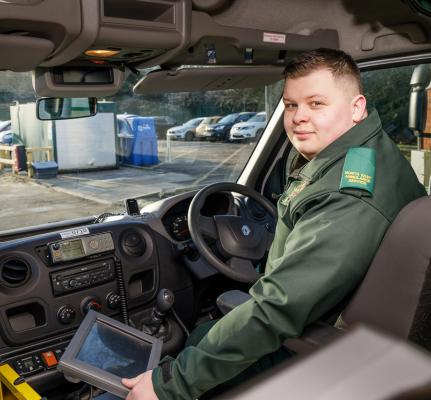Ambulance care assistant and Patient Transport Service (PTS) driver
Ambulance care assistants or Patient Transport Service (PTS) drivers drive disabled, elderly, sick or vulnerable people to and from outpatient clinics, day care centres and routine hospital admissions.
Working life
You'll be responsible for looking after your passengers and, because many of them will be in poor health, you will also need life-saving skills in case there is a medical emergency.
As well as driving, you'll lift and help patients in and out of the vehicle. You'll make sure they're safe and comfortable during the journey and arrive on time for their appointment.
Some of your passengers will be anxious about their hospital visit and others will lead isolated lives so will value your reassuring manner and the chance to chat. You'll often see the same people on a regular basis and get to know them.
You'll be based at an ambulance station or a hospital and cover a local area. You may have to work shifts. You might be part of a two-person team using a specially-designed ambulance with a tail-lift for wheelchairs, carrying several people on each journey. Alternatively, you might work on your own, driving a standard car to transport one or two people at a time.
Your duties will include making sure that the vehicle is clean and tidy and keeping an accurate record of their journeys. More experienced PTS drivers may take on specialist work such as transporting:
- babies
- mental health patients
- people nearing the end of their lives
- kidney patients
Adam Randall
Ambulance care assistant
Read Adam's storyI love that every day is different; I meet lots of people who are usually in poor health and get a lot of enjoyment from being able to have a positive impact on what can be a daunting experience for many of them.

Entry requirements
There are no set entry requirements to become an ambulance care assistant and patient transport driver. Most employers expect good standards of literacy and numeracy and some may ask for qualifications such as GCSEs, NVQs or equivalent. Employers look for relevant work experience so it would be an advantage if you have worked with elderly or disabled people, either in paid employment or voluntary work.
Driving licence
Most employers expect you have a full, manual driving licence when you apply. If you passed your test after 1996, you may need an extra driving qualification for larger vehicles and carrying passengers, so check carefully which classifications you need on your licence.
Must have skills
You'll need to be patient, caring and calm. You'll need to be interested in other people, be able to reassure people who may be nervous and deal with challenging behaviour. You'll also need to be physically fit and have excellent communication skills.
Training and development
You'll usually have an initial two to three week training course that covers
- moving and handling techniques
- first aid
- basic patient skills
- safe driving techniques
Training includes practical assessments and written exams. Once you have passed these tests, you'll work under the guidance of a trained supervisor before working unsupervised.
As your career progresses, you could become a team leader or supervisor and take charge of a team of assistants and drivers. You could take further training to become an emergency care assistant. With more experience, you could apply to train as a paramedic. You would have to pass entrance exams and meet other requirements before being accepted onto a paramedic course.
Pay and benefits
Your standard working week will be around 37.5 hours and may include a shifts, such as early starts, evenings and weekends. You’ll be paid on the Agenda for Change (AFC) pay system, typically starting on band 2 or 3.
You’ll also have access to our generous pension scheme and health service discounts, as well as 27 days of annual leave, plus bank holidays, which increases the longer you’re in service.




